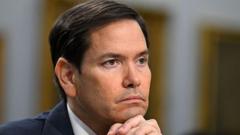The Trump administration has announced a halt on student visa appointment schedules at embassies, coupled with plans to intensify social media vetting of applicants. Secretary of State Marco Rubio conveyed this decision in a memo, stating that the pause would remain in place "until further guidance is issued". While embassies are instructed to cancel unfilled appointments for prospective students, those already scheduled will proceed as planned.
This directive is part of a broader crackdown on foreign students, following Trump's criticisms of prestigious colleges perceived to harbor liberal biases, which he claims perpetuate antisemitism and discriminatory admission practices. The heightened vetting procedures are anticipated to have significant ramifications for both consulates and applicant experiences.
Typically, international students seek visa approval through interviews at U.S. embassies in their home countries, a crucial step for many educational institutions, which depend on foreign student tuition for funding. A State Department spokesperson emphasized the importance of thorough vetting during a Tuesday briefing, stating that the government remains committed to scrutinizing entrants to the U.S.
In recent months, the Trump administration has inhibited millions of dollars in federal funding to universities and has pushed for the deportation of international students, alongside a wave of visa revocations—actions that have frequently been met with legal challenges. The White House further criticizes universities for permitting pro-Palestinian discourse that it views as crossing into antisemitism.
Harvard University has been a primary target of Trump's administration, which recently contested its ability to enroll international students. While a federal judge temporarily prevented this measure, the potential implications of such a policy threaten to greatly impact the university, wherein a substantial percentage of the student population is composed of international scholars.
This controversial policy shift is met with resistance from academic leaders, who accuse the administration of undermining free speech and thereby threatening the core values of higher education in the nation.






















